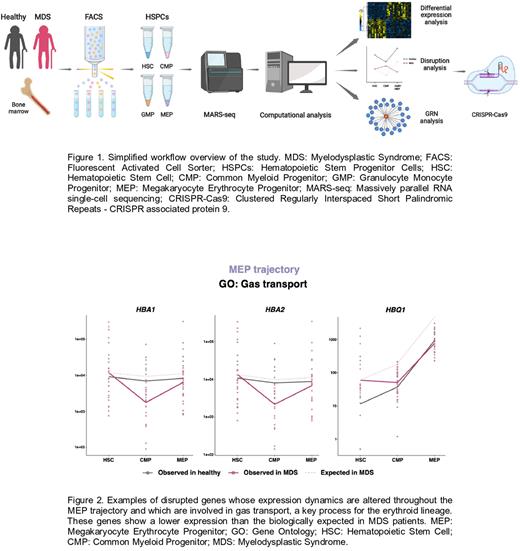Abstract
Background: Myelodysplastic syndromes (MDS) are a group of hematological malignancies characterized by ineffective hematopoiesis due to defective maturation and differentiation of hematopoietic stem and progenitor cells (HSPCs). To date, molecular studies of MDS have mainly focused on genomic alterations, but these lesions fail to fully explain the development of the disease.
Objective: In order to determine the factors involved in the abnormal differentiation of HSPCs in MDS, we compared the transcriptional alterations occurring along two myeloid differentiation lineages: the one giving rise to monocytes and granulocytes (HSC→CMP→GMP), and the one leading to megakaryocytes and erythrocytes (HSC→CMP→MEP).
Materials and methods: So as to identify transcriptional alterations, bulk RNA-sequencing was chosen above single cell, as its greater depth enables the identification of alterations that would be impossible to detect at the single cell level. This technique was performed on FACS-sorted populations (HSCs, CMPs, GMPs, MEPs). Cells were obtained from a group of elderly donors (median age of 70 years, n=12) and untreated MDS patients with single-/multi-lineage dysplasia (n=18).
Results: After determining the transcriptional profiles of HSPCs by bulk RNA-seq, an exhaustive computational analysis was conducted. Firstly, differentially expressed genes (DEGs) were determined between healthy and MDS cells using DEseq2. These studies showed a very limited overlap between DEGs of HSPCs in MDS, indicating that at each stage of early myeloid differentiation specific genes are being altered in the disease. However, 10 DEGs appeared to be consistently altered throughout early hematopoiesis, some of which had been previously associated with hematological malignancies. Secondly, by performing a novel statistical analysis termed disruption analysis, genes with altered expression dynamics in the MDS differentiation process were identified. These analyses showed 579 and 711 genes with altered dynamics in MDS cells relative to healthy cells throughout differentiation to GMP or MEP. The vast majority of these genes were globally disrupted either positively or negatively, meaning their expression was progressively lower or higher than the biologically expected at each step of the differentiation process. Functional analysis suggested that negatively altered genes participate in processes of great relevance for the differentiation and functionality of myeloid cells, such as: 1) neutrophil activation and degranulation in the GMP pathway, or 2) gas transport in the MEP pathway. Finally, in order to identify mechanistically altered gene regulatory networks (GRNs) in MDS, our recently developed TraRe algorithm was used. These studies identified regulons guided by transcription factors (TFs) that could be key to the behavior of MDS cells. Among them, ZNF350 and ZMAT2, TFs previously unrelated to the disease, appeared to decrease the expression of negatively altered genes that are critical for hematopoiesis, whereas SMARCD3 seemed to increase the expression of positively altered genes previously associated with cell migration and therapy resistance in acute myeloid leukemia (AML). These results suggest that these TFs might be causing transcriptomic dysregulation leading to the MDS phenotype. Finally, a CRISPR-Cas9 screening performed on MDS/AML cell lines showed that inhibition of ZNF350, ZMAT2 and SMARCD3 ameliorates the ability of these cells to differentiate properly.
Conclusions: Collectively, this work offers a new approach in the study of the molecular pathogenesis of MDS, and reveals novel transcriptional alterations and GRNs involved in the disease not described to date. These lesions could be key to understand the ineffective hematopoiesis of these patients and could represent potential therapeutic targets.
Disclosures
San Martin-Uriz:Illumina: Other: non-substantial shareholder; 10X Genomics: Other: non-substantial shareholder. Diez-Campelo:Bristol Myers Squibb: Consultancy, Honoraria, Membership on an entity's Board of Directors or advisory committees, Research Funding; Takeda: Honoraria, Membership on an entity's Board of Directors or advisory committees; BluePrint: Membership on an entity's Board of Directors or advisory committees; Novartis: Consultancy, Honoraria, Membership on an entity's Board of Directors or advisory committees. Molero:Oryzon Genomics: Consultancy.
Author notes
Asterisk with author names denotes non-ASH members.


This feature is available to Subscribers Only
Sign In or Create an Account Close Modal